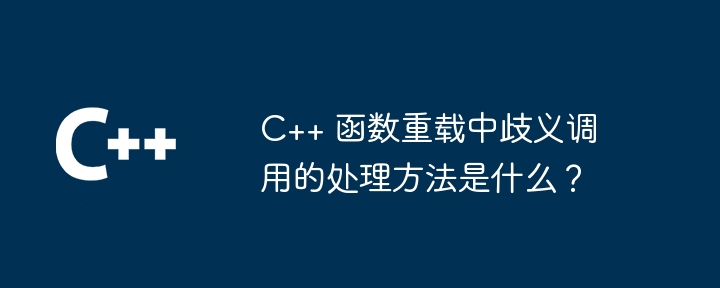Home >Backend Development >C++ >How to handle ambiguous calls in C++ function overloading?
How to handle ambiguous calls in C++ function overloading?
- PHPzOriginal
- 2024-04-13 21:18:011495browse
Ambiguous calls occur when the compiler cannot determine which overloaded function to call. Solutions include providing a unique function signature (parameter type and number) for each overloaded function. Use explicit type conversion to force the correct function to be called if an overloaded function's parameter types are more suitable for the parameters of a given call. If the compiler cannot resolve an ambiguous call, an error message will be generated and the function overloading will need to be rechecked and modified.

How to handle ambiguous calls in C function overloading
Function overloading is a feature in C that allows Create multiple functions with the same name but different parameter lists in the same scope. While this provides additional flexibility, in some cases it can lead to ambiguous calls, where the compiler cannot determine which overloaded function to call.
Causes of ambiguous calls
Ambiguous calls are usually caused by the following two situations:
- The same number of parameters: When multiple overloaded functions have the same number of arguments, the compiler may not be able to determine which function better matches a given call.
- Similar parameter types: When overloaded functions have similar parameter types, the compiler may not be able to determine which parameter better matches the parameters in a given call.
Handling methods for ambiguous calls
C provides the following methods to handle ambiguous calls:
- Function signature : Ambiguity can be eliminated by giving each overloaded function a unique function signature (parameter type and number). For example:
void foo(int i); void foo(double d);
- Explicit type conversion: If the parameter type of an overloaded function is more suitable for the parameters of a given call, you can use explicit type conversion to Force the correct function to be called. For example:
int i = 5; double d = 3.14; foo(static_cast<double>(i)); // 调用 foo(double) foo(d); // 调用 foo(int)
- Compiler Error: If the compiler cannot resolve an ambiguous call, it will produce an error message. At this point, you need to recheck the function overloading and make appropriate modifications.
Practical case
Consider the following example code:
#include <iostream>
using namespace std;
// 重载函数
int add(int a, int b) {
cout << "Int: ";
return a + b;
}
double add(double a, double b) {
cout << "Double: ";
return a + b;
}
int main() {
// 歧义调用(参数数量相同)
cout << add(1, 2) << endl;
// 使用显式类型转换
double x = 1.5, y = 2.5;
cout << add(static_cast<double>(x), y) << endl;
return 0;
}Without explicit type conversion, add( 1, 2) The call will be ambiguous because the compiler cannot determine whether to call add(int, int) or add(double, double). By adding an explicit type conversion, the compiler can explicitly choose add(double, double) because it better matches the given arguments.
The above is the detailed content of How to handle ambiguous calls in C++ function overloading?. For more information, please follow other related articles on the PHP Chinese website!

